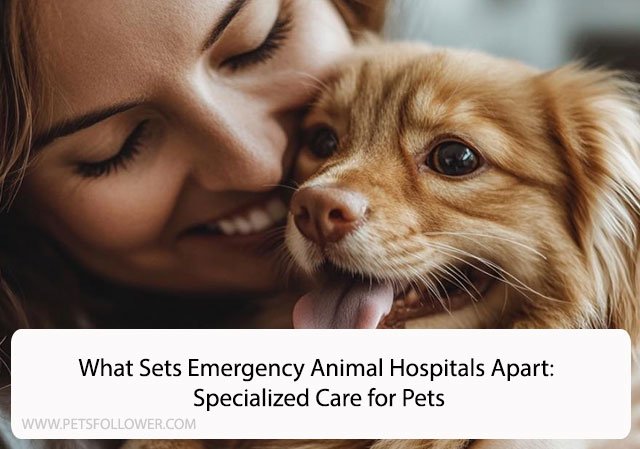
When it comes to our furry family members, their health and well-being are of utmost importance. While routine veterinary care is essential for maintaining your pet’s health, there are times when unexpected medical situations arise, requiring immediate attention. This is where emergency animal hospitals play a crucial role in providing specialized care for pets in critical condition.
Emergency veterinary care differs significantly from regular veterinary services, offering a unique set of capabilities and resources to handle urgent and complex medical situations. Let’s explore what sets emergency animal hospitals apart and why they are indispensable for pet owners.
24/7 Availability
One of the most distinguishing features of an emergency animal hospital is its round-the-clock availability. Unlike regular veterinary clinics that operate during standard business hours, emergency vet clinics are open 24 hours a day, 365 days a year. This constant availability ensures that pet owners have access to critical care at any time, day or night.
When faced with a pet emergency, time is often of the essence. Having a 24-hour animal hospital nearby can make all the difference in saving a pet’s life. Whether it’s a late-night accident, sudden illness, or a weekend crisis, emergency veterinarians are always ready to provide immediate care.
Specialized Equipment and Facilities
Emergency animal hospitals are equipped with advanced medical technology and facilities designed to handle a wide range of urgent medical situations. These may include:
1. State-of-the-art diagnostic equipment: X-ray machines, ultrasound devices, and in-house laboratories for quick and accurate diagnoses.
2. Intensive care units (ICU): Specialized areas for monitoring and treating critically ill pets.
3. Surgical suites: Fully equipped operating rooms for emergency surgeries.
4. Blood banks: Access to blood and plasma for life-saving transfusions.
5. Oxygen therapy units: For pets experiencing respiratory distress.
This specialized equipment allows emergency veterinarians to quickly assess, diagnose, and treat pets in critical condition, providing a level of care that may not be available at standard veterinary clinics.
Highly Trained Staff
Emergency veterinarians and support staff undergo extensive training to handle high-stress, urgent medical situations. These professionals are skilled in:
1. Triage: Quickly assessing the severity of a pet’s condition and prioritizing care.
2. Emergency procedures: Performing life-saving interventions such as CPR, wound care, and stabilization of critical patients.
3. Pain management: Providing immediate relief for pets in distress.
4. Critical care: Monitoring and treating pets with severe illnesses or injuries.
The staff at emergency animal hospitals are prepared to handle a diverse range of pet emergencies, from traumatic injuries to sudden illnesses, ensuring that your pet receives expert care when they need it most.
Comprehensive Emergency Services
Emergency vet clinics offer a wide array of services to address various urgent medical needs. These may include:
1. Treatment for poisoning or ingestion of toxic substances
2. Management of severe allergic reactions
3. Care for traumatic injuries from accidents or animal attacks
4. Treatment for acute illnesses such as bloat, seizures, or respiratory distress
5. Emergency surgeries for conditions like internal bleeding or obstructions
These comprehensive services allow emergency veterinarians to address complex medical situations that require immediate attention and specialized care.
Seamless Coordination with Primary Care Vets
While emergency animal hospitals excel in providing urgent care, they also work closely with primary care veterinarians to ensure continuity of care for pets. After treating an emergency, these hospitals provide detailed reports to the pet’s regular vet, allowing for seamless follow-up care and ongoing treatment if necessary.
This coordination between emergency and primary care veterinarians ensures that your pet receives comprehensive care, combining the urgency of emergency treatment with the long-term health management provided by their regular vet.
Emotional Support for Pet Owners
Dealing with a pet emergency can be an incredibly stressful experience for pet owners. Emergency animal hospitals understand this and often provide emotional support and clear communication throughout the treatment process. Staff members are trained to explain complex medical situations in understandable terms, discuss treatment options, and provide compassionate care not just for the pets, but for their worried owners as well.
When to Seek Emergency Veterinary Care
Knowing when to seek emergency care is crucial for pet owners. Some situations that warrant immediate veterinary attention include:
1. Difficulty breathing or choking
2. Severe bleeding or trauma
3. Ingestion of toxic substances
4. Sudden collapse or loss of consciousness
5. Severe vomiting or diarrhea
6. Signs of extreme pain
7. Inability to urinate or defecate
8. Seizures or neurological symptoms
If you’re ever in doubt about whether your pet needs emergency care, it’s always best to err on the side of caution and contact an emergency vet clinic for guidance.
Emergency animal hospitals play a vital role in the landscape of veterinary care, offering specialized services, advanced equipment, and highly trained staff to handle urgent pet health crises. Their 24/7 availability, comprehensive emergency services, and ability to provide critical care set them apart from regular veterinary clinics. In New York City, facilities like URvet Care exemplify the high standards of emergency animal hospitals, offering specialized care around the clock. For pet owners, knowing the location of the nearest emergency vet clinic and understanding when to seek urgent care can make all the difference in ensuring the health and well-being of their beloved pets.
Remember, in times of pet emergencies, having access to specialized care can be life-saving. Always keep the contact information for your nearest emergency animal hospital readily available, because when it comes to your pet’s health, every moment counts.






